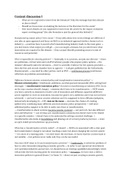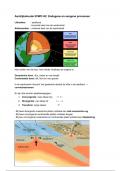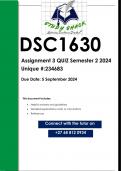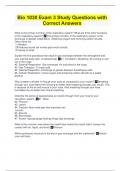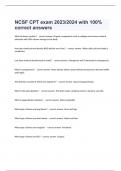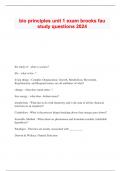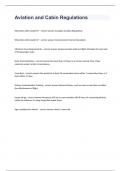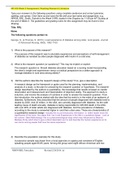- What are we expected to know from the literature? Only the message that they discuss
or also in detail?
- Should we focus more on studying the lectures or the literature for the exam?
- How much details are you supposed to know from the article by the impact evaluation
expert working group? Like also formulas or just the general idea behind it?
Manufacturing output policy? Not crucial → Foray talks about how several things are different if
you take an open approach and focus on R&D or an industrial approach (either choose tech or
industry) → countries have to search which manufacturing industry leads to the most gains →
you don’t know what output you will get → you can target a domain, but you don’t know what
innovations are required in this domain → they can just identify promising areas in terms of
resources and potential.
Who’s responsible for choosing policies? → Nationally, it is a process, not just one director → there
are politicians, civil servants and a staff of advisory people who prepare policy options → the
minister ultimately takes the decisions → there is scientific evidence for the options provided →
then the first and second chamber have to approve → it all gets published (in the Netherlands;
Staatscourant) → executed by other parties, such as RVO → continuous process (continuous
reflection on problems and solutions).
Difference between mission-oriented policy and transformative innovation policy? →
Mission-oriented policy = timebound, ambitious, societal goal and measurable (FEX. solving food
shortage) → transformative innovation policy = focused on transforming an industry (FEX. focus
on the way a system should change) → missions don’t have to be transformative → MOP means
you have a priority (a mission) to involve a lot of innovation and diffusion capacities (different
actors together to work on innovation, because the goal is very ambitious and it has not yet been
achieved) → can lead to more creative solutions and it is supposed to drive diffusion (adoption,
instead only developing it) → FEX. man on the moon → increase the chance of creating
spillovers by combining many different actors (economic policy perspective) → still need
additional policy support to be able to make sure there is transformation.
→ transformation is about systems (social economic systems) → not just tech, but also different
laws and behaviour → can overlap, (are transformative missions), but doesn’t have to be related
to a specific mission → doesn’t have to be motivated by solving a societal challenge →
transformative also looks at destabilising and phasing out of current products/services → more
an open ended process (bottom-up processes).
When has a transformative activity ended? → It doesn’t → MOPs are associated with a clear goal,
but transformative change is not about reaching a state, but about changing the current system
→ it is more of a starting point → we don’t know the end state, we know that the current state is
not suitable → but policies never really end, they can be successful.
How does MOP relate to S3 and transformative activities? → Traditionally, it solved the problem of
how to solve innovation (targeting economic growth) → in order to not spread out investments
over potential industries and sectors, we should focus on existing capabilities (knowledge), which
will provide the best starting point for innovation policy → Nowadays, we have seen a shift in
innovation policies in general (frame 2 to frame 3) → about not just creating economic growth,


